- Home
- Ninie Hammon
Mad Dog (Nowhere, USA Book 2) Page 2
Mad Dog (Nowhere, USA Book 2) Read online
Page 2
“No, that ain’t what I’m sayin’. I’m sayin’ you hadn’t ought to sell folks more’n they need.” She gestured toward Truman Haggardy, who had stormed back into the store after the boys relieved him of his haul of toilet paper. “You do, and pretty soon folks is gonna have to start doing without. And folks who are doing without … well, they ain’t usually in the best mood, likely to … do just about anything.”
She turned to the crowd. “You good folks wasn’t thinking about being neighborly when you filled up them carts but now that you been reminded how you’d ought to treat folks, you ain’t gonna mind putting all that stuff back” — she paused, looked pointedly at several people in line — “are you?”
“My family’s got to eat,” said Ramona Mattingly.
“You can’t tell me I can’t buy groceries,” said George Gribbins.
Before others could speak, Viola put on her game face. She nodded at Neb, Obie and Zach standing by the door.
“You want this to get ugly? I can do ugly. I don’t never play for pennies. You want in this game, you better be prepared to go for broke.”
Nobody spoke.
Viola stuck a smile on her face that hung there like a sheet on a clothesline.
“You get the groceries you’d have bought if there wasn’t no mirage thingy hanging on the county line. You get yourselves enough to last you a few days.” She turned to Oscar but spoke loud enough for everyone to hear. “And Oscar here, he ain’t gonna sell you no more’n that … are you, Oscar?”
“Nope,” was all he said.
“And if anybody tries to make Oscar do something un-neighborly, Oscar’s gonna let me know about that, and whoever does something like that will be getting a little visit shortly from my three boys.”
Then she just stood there. Sometimes the best club to beat somebody over the head with was silence. One by one, the people in line turned their carts around and started back down the aisles. She watched for a few minutes, then turned to Oscar.
“You done right, Oscar,” she said. “I always remember them as does right by me.”
Then Viola went to the shopping carts, pulled one out of line, and started to gather up her own groceries.
Chapter Three
As he turned off Rooster Run Road onto Zebulon Pike, Harry Tungate was still thinking about toilet paper, wondering how long his two rolls was gonna hold out. Likely most other folks was doing the same calculation. When Viola’d locked down Foodtown two weeks ago, the realness of their situation had hit home with people, settled them down and focused them. Not being able to wipe your butt’d sober any man.
Being a practical sort, Harry Tungate didn’t waste any mental energy trying to figure out what the Jabberwock was and why it’d happened. They was smarter people than him in the county who could figure out that part. And there was bound to be folks out on the other side of the Jabberwock who was trying to figure it out, too. The government and such. He’d bet the biggest story on The Today Show, Meet the Press, 60 Minutes, and Dateline every night was about this little place in Kentucky couldn’t nobody get into. He did wonder sometimes what happened to people who challenged the Jabberwock from the other side, though. Where’d they get transported to and was they sick when they got there?
He shook his head to get that thought out of his mind. He hadn’t never been and praise Jesus hoped never to be again as sick as he had been that day he and Roscoe’d headed up Lexington to see what was taking Leon so long to bring them their beer. Roscoe had took a week’s vacation from Foodtown starting on Monday and the two of them and some other buddies was planning on spending it fishing in the Rolling Fork. Maybe take a day and drive up to Lake Cumberland and wet a hook there. They’d needed that beer, so Roscoe’d come by and picked him up and they’d headed out …
And wound up in the Middle of Nowhere. Sick. Didn’t last long but for the time it did, he thought it was gonna kill him. Like it did Abby Clayton.
That wasn’t anything Harry let himself think about. He’d been there. He and Roscoe and Abner had stayed around to help out once they seen what kinda shape folks was in when they got there. He shoulda left before he seen Abby, though, would give just about everything he owned — which, granted, wasn’t a whole lot — to wipe that image out of his mind. Her head … pieces of it flying ever which way. A piece of something, he didn’t know what and didn’t want to know, had hit his shoe and he’d scraped it off on the asphalt.
At least it was Roscoe’s car and not Harry’s truck that got took that day. Roscoe lived on Kelly Branch Road on the south side of Callahan Mountain — wasn’t but a few miles from the Ridge. Harry lived in Soloman Hollow on the north side of the mountain, had to go all the way around it to get to town and that was a hike. Roscoe could do without a car a sight better than Harry could do without a truck. Except when the gasoline ran out, Harry wouldn’t have no truck, neither.
Harry fired up a prayer — out loud. Since he lived alone, he almost always prayed out loud. Kept it clear in his mind that he really was carrying on conversation — he just couldn’t hear the other side of it, that’s all: “I know you’s getting tired of hearing about this, God, but I’m gonna have a hard row to hoe if there ain’t no gas and I can’t go nowhere. I’m asking you respectful-like to fix this thing and make everything like it was before. Amen.”
That was another way him and Roscoe was different. Oh, Roscoe wasn’t bad as some — guys who wouldn’t recognize a bigger meaning to life if God punched them in the face wearing a ring that left the initials G.O.D. on their foreheads. But Roscoe didn’t believe strong as Harry did. Though what was going on now mighta made a believer outta him and a whole bunch of other folks, too.
Abner Riley, now — there was a man of faith. Harry was glad to be spending time with him today because he never left Abner without feeling better about life.
Wasn’t hard to see why Abner was so spiritual. That harelip of his that his daddy’d sewed shut with a needle and thread when he was three or four years old, had been a life burden that’d either humble a man and send him to his knees — or make him bitter. Though Abner never said much — he didn’t like to talk because he sounded so funny — when he talked about God you’s hearing from a man who’d got up close and personal.
Harry’d told Abner he’d come over today and help him work on that Allis-Chalmers tractor that’d been sitting in Abner’s shed gathering dust for probably a decade. It’d made sense to Abner — and Harry agreed — that might be a good idea to plant a garden this year even if gardening wasn’t something you usually done. There was a piece of flat bottom land out behind Abner’s house that he was thinking of tilling up and planting vegetables. With gasoline, once it’s gone, won’t be no more of it, but food was a different thing altogether. This was a farming community and folks here wasn’t likely to starve to death because of the Jabberwock — though the complexities of how Nowhere County farmers’ produce and beef was gonna wind up on the plates of county residences — that was another thing he’d leave up to other folks to figure out.
Roscoe’d pointed at a flock of birds flying across a field the other day and wondered if maybe the people outside who was working on getting rid of the Jabberwock might send in supplies — like them airdrops you seen on TV where the army puts stuff on airplanes and drops it at the end of a parachute to the folks who’ve had an earthquake or hurricane or such as that. Maybe they’d send in supplies to Nowhere County. But the thing the county needed most, in Harry’s opinion, was fuel and that wasn’t something you could drop out an airplane at the end of a parachute.
Abner had a little house back deep in Fearsome Hollow on Fog Bottom Lane off Gabe Stump Road, and Harry teased him about the “haints” that was his “neighbors,” asked him had he ever seen one and was they scary. Everbody’d growed up hearing tales about the spirits, or ghosts — the old folks called them haints — that lived there in the mist. He supposed that’s why it’d got named Fearsome Hollow, because the mists made it all spooky-lik
e. The Smokies in Tennessee got named the Smoky Mountains for the same reason — mist, which was like to show up anywhere in the Smokies, not just in the one hollow like it done here. When you got up high in one of them overlooks in Great Smoky Mountains National Park, you’d swear the place was on fire — smoke here and there, hanging over that valley or down in that hollow or above that ridge. Wasn’t smoke, of course, just mist, and it was the same with Fearsome Hollow — the mist would be hanging over Troublesome Creek one day and the next it’d be up at the top of the hollow so thick you couldn’t even see Buzzard Knob.
Didn’t hardly nobody go all the way out to Abner’s and that was a shame ‘cause those who did was like to be surprised at what a nice place he had. Oh, wasn’t big but it was red brick and Abner put another coat of white paint on the trim, the shutters and the picket fence every spring. He didn’t make much as an orderly, had said once it took him five years to save up enough for a down payment, and once he got the place and fixed it up nice, he kept it so pin neat Roscoe teased him about using scissors on the grass in the front yard.
Harry didn’t park in the driveway, just pulled off the road onto the shoulder in front of Abner’s house and killed the engine. He hadn’t even got out of the truck before he noticed that Abner’s front door was standing wide open.
That was odd. He paused, sat looking at it.
It had got quiet all sudden-like, no sound but the ticking of the engine cooling off. It felt kinda spooky, though wasn’t no mist. Mist made it creepy sometimes but wasn’t nothing but bright blue sky and sunshine now. He opened his door and got down out of his truck and hollered for Abner, who musta been around the side of the house or something, otherwise he’d have closed the door when he walked out.
There was no answer.
“Yo, Abner, where you at?” For no reason he could explain, Harry didn’t want to open the front gate and go up the walk to that open door. That was crazy.
“You born in a barn, boy?” he called out from where he stood by the open door of his truck, but he didn’t get any closer to the house. “You left your danged door open.”
The only response was silence. A full, heavy, throbbing silence. There was a screen door on the back but wasn’t even a storm door on the front so Abner was letting in flies and bugs and …
Harry’s heart kicked into a gallop. Why, maybe Abner was sick or something, fell down and hit his head …
Why was the door open?
And why was there …? No, that was crazy, just his heebie-jeebies getting to him. He stood still, just looking, listening. And it was real — there really was a cool breeze blowing out that front door. Musta had the back door open, too — with the screen shut, of course. So there was a draft …
It was a warm June morning, probably get up into the eighties by afternoon.
Wasn’t warm in that house, though. No sir. It was—
Cold as an empty grave …
When the bones are tossed away.
Harry turned around so fast he got his feet tangled up and almost fell down on his butt. But there wasn’t nobody there. Well, somebody — two somebodies — said …
An unreasoning terror seized Harry’s heart and squeezed so hard he couldn’t get his breath. He leapt back into the truck, fumbled around with shaking fingers to fit the key that was still in his hand back into the ignition.
When the engine roared to life, he reached for the gearshift to put the truck in gear and the house …
It was a dream, had to be, wasn’t no way a house could … breathe. Could inhale so the walls swelled outward. Then exhale, blow a breath of cold out the front door that rushed down the sidewalk to Harry’s truck. Harry slammed the gearshift into drive with a strength that might have ripped the knob off the top of the handle. He jammed his foot down on the accelerator and yanked the steering wheel in a full-lock turn left. The old truck shuddered and spun around in the road, kicking up a plume of dust in the air behind him as he roared away.
But not before that cold hit his truck.
Not before he gasped in a breath and breathed back out … and his own breath frosted in the air in front of him.
Chapter Four
Charlie McClintock opened her eyes and the period of fuzzy unreality — that blissful non-place where you were back in an ordinary world with reasonable rules and everything was right in the universe — lasted only four or five seconds. It seemed to her that the period of unawareness before her mind reoriented was getting shorter and shorter every day. It wouldn’t be long before she opened her eyes and knew instantly that she was a captive, could not leave Nowhere County, Kentucky. Knew that an invisible barrier called the Jabberwock would hurl her back to the Middle of Nowhere if she tried, and “hurl” was the right word because she wouldn’t just be miraculously transported — she would be projectile vomiting when she got there. Or worse. As far as she knew, the only person who had ever ridden the Jabberwock more than one time was Abby Clayton. And she had … exploded.
Charlie paused. Waited. Looked at the ceiling of her bedroom where the shadows of tree limbs danced to the tune of the morning wind. Nope, it still wasn’t there. She still could find not a shred of compassion for the woman who had locked Charlie’s precious three-year-old daughter in an airless kiln. Or would have if she’d had the strength; the intent had been there. Charlie wanted to be compassionate because she saw herself as a compassionate person, a better person than she was allowing herself to be right now. Maybe someday.
Charlie had even intended to go to Abby’s memorial service, had written it on the calendar on the wall in the kitchen beside her mother’s big “Not in Kansas Anymore, ToDo” blackboard. But she hadn’t gone. She couldn’t go without opening the door on the memories of those nightmare hours when she thought her precious baby was dead, suffocated, murdered by Abby Clayton. And even though she never allowed herself to think about it, the memories were like a drip of black ink in a glass of water, they spread out and darkened everything. She wanted that part to be over. Going to the service would just spread more black ink.
That would be a step backward and today Charlie had planned a step forward, toward accepting the unacceptable, not about Abby and her attempted murder of Merrie, but about Charlie and life as we know it on the planet. This was about tomorrow and the other tomorrows stacked up on the other side of it.
She’d left Nower County the morning after she graduated from high school and hadn’t returned but a couple of times in the fourteen years since. She’d started college, but hadn’t made it past her freshman year courtesy of the momentous day disguised as a totally ordinary day when her English professor assigned a children’s story as the class’s writing assignment.
She wrote it during her breaks at the Dunkin’ Donuts where she worked, turned it in, got the paper back with no grade and the words “See me after class” written in red on the top. Goody. She really needed to make an A in this class because the required math (algorithms) and science (geology) classes were kicking her butt.
Her story was good, he’d told her, really good. Like industrial-strength good — and she was glad he liked it, she really was, but if he didn’t shut up about it she’d be late for work. Did she mind if he showed it to a friend of his in publishing? If he’d just give her an A and stop babbling, she didn’t care if he used it to potty train a puppy.
That was eleven books in a twelve-book series ago. A bestselling fantasy for middle school-age kids that captured the imaginations of readers from eight to eighty. Hollywood made into it the most popular cartoon series on television. And the movie deal was all but sewn up. The twelfth book had pre-order sales in the ba-jillions and it wasn’t even written. She knew the plot, though, and it would be the best book of them all.
Then her mother had washed overboard off a yacht in the Florida Keys, Charlie had come home and … the Jabberwock.
Writing was more to Charlie than what she did. It was who she was. This enforced sabbatical had backed words up in her mind like a clogg
ed sewer and the pressure was building. So she’d made a decision. She’d get out of Nowhere County eventually — she believed that, had to believe that — and when she did, she’d have something to show for the time she’d spent incarcerated here. She would write the twelfth book, which ironically, was about an invisible dragon.
Charlie certainly had plenty of time on her hands now to write. For two weeks, she’d been struggling to fill her days. She hung out as often as she could with Sam, E.J. and Malachi, but Sam and E.J. both had jobs that still mattered in the “new normal” and Malachi lived so far out in the sticks you’d have to leave a trail of bread crumbs to find your way back. She and Sam had reconnected emotionally like they were still in fifth grade and the more Charlie came to know the woman Sam had grown to be, the more she respected her. She’d made a life in Nowhere County, had a Mother-Teresa-esque vibe among the most isolated nowhere people, was raising a son, a fine young man whose father was … who/where? She and Sam hadn’t gotten that far yet, would eventually, though. Sam had made references to several men she’d dated over the years, but her son’s father hadn’t yet come up. Neither had Merrie’s father.
Charlie had cleaned and polished and organized her mother’s house — found paint and repainted a bedroom, even tried her hand at using her mother’s sewing machine. Major fail there. Other people weren’t as fortunate as Charlie, were even now having to scramble for essentials, planting gardens or making “trade agreements” with neighbors — I’ll trade my five pounds of sugar for your fresh tomatoes. Sylvia Ryan hadn’t been a hoarder. She’d only nudged up against the title because she’d had a huge garden and like every other woman in the county, she “canned” what she grew there. The rows of shelving that once held pottery in the garage were now weighed down, stacked three and four deep, with hundreds of Mason jars filled with garden vegetables along with jellies, jams, preserves and chutney her mother made from fresh fruit. Though the cellar was full of the flotsam and jetsam of a lifetime, there was also a huge freezer down there full of meat. The kitchen cabinets were jammed with everything from Spam to bean dip. It wasn’t a magic pitcher. Eventually, Charlie’s supplies would run out. Everybody’s would. And then … She’d cross that bridge when “and then” got here.

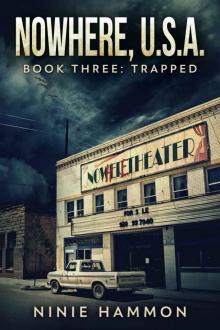 Trapped (Nowhere, USA Book 3)
Trapped (Nowhere, USA Book 3)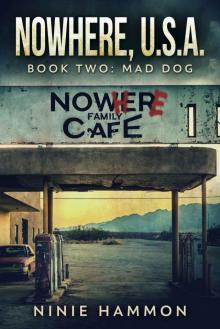 Mad Dog (Nowhere, USA Book 2)
Mad Dog (Nowhere, USA Book 2) Black Water
Black Water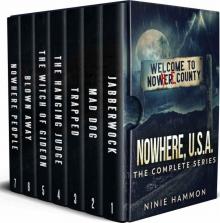 Nowhere USA: The Complete Series: A Psychological Thriller series (Nowhere, USA)
Nowhere USA: The Complete Series: A Psychological Thriller series (Nowhere, USA)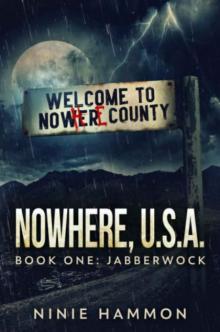 The Jabberwock
The Jabberwock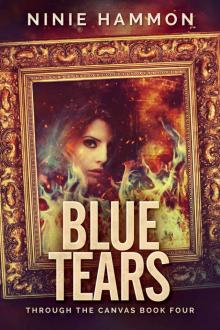 Blue Tears
Blue Tears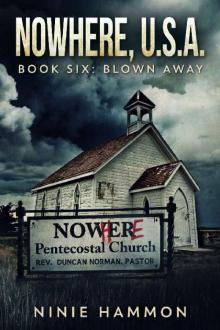 Blown Away (Nowhere, USA Book 6)
Blown Away (Nowhere, USA Book 6)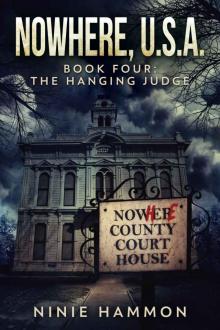 The Hanging Judge (Nowhere, USA Book 4)
The Hanging Judge (Nowhere, USA Book 4)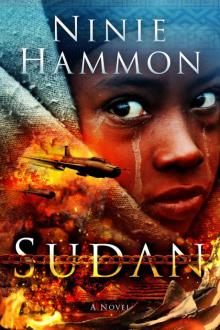 Sudan: A Novel
Sudan: A Novel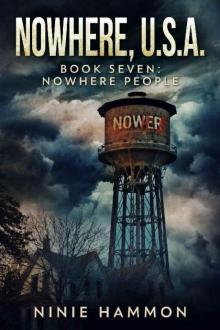 Nowhere People (Nowhere, USA Book 7)
Nowhere People (Nowhere, USA Book 7)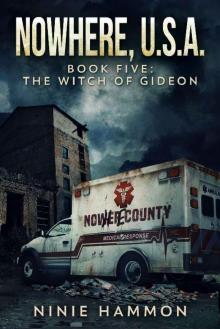 The Witch of Gideon (Nowhere, USA Book 5)
The Witch of Gideon (Nowhere, USA Book 5)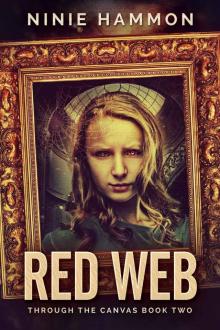 Red Web
Red Web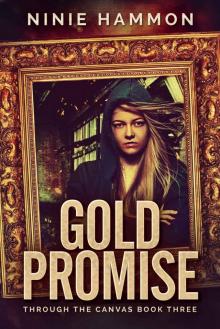 Gold Promise
Gold Promise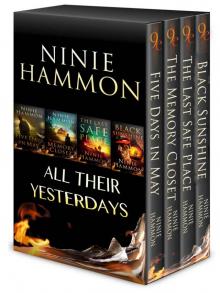 All Their Yesterdays
All Their Yesterdays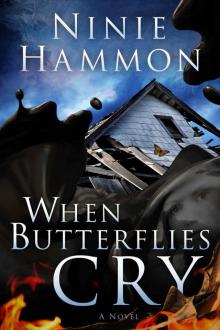 When Butterflies Cry: A Novel
When Butterflies Cry: A Novel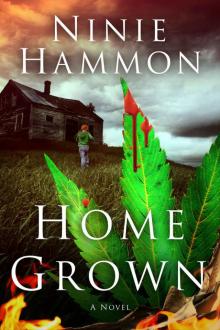 Home Grown: A Novel
Home Grown: A Novel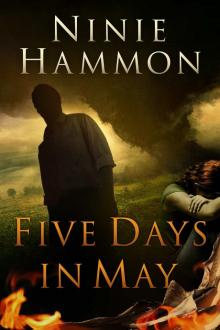 Five Days in May
Five Days in May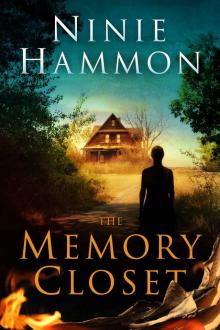 The Memory Closet
The Memory Closet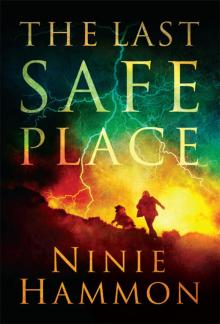 The Last Safe Place
The Last Safe Place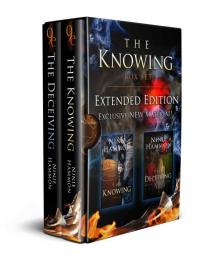 The Knowing Box Set EXTENDED EDITION: Exclusive New Material
The Knowing Box Set EXTENDED EDITION: Exclusive New Material